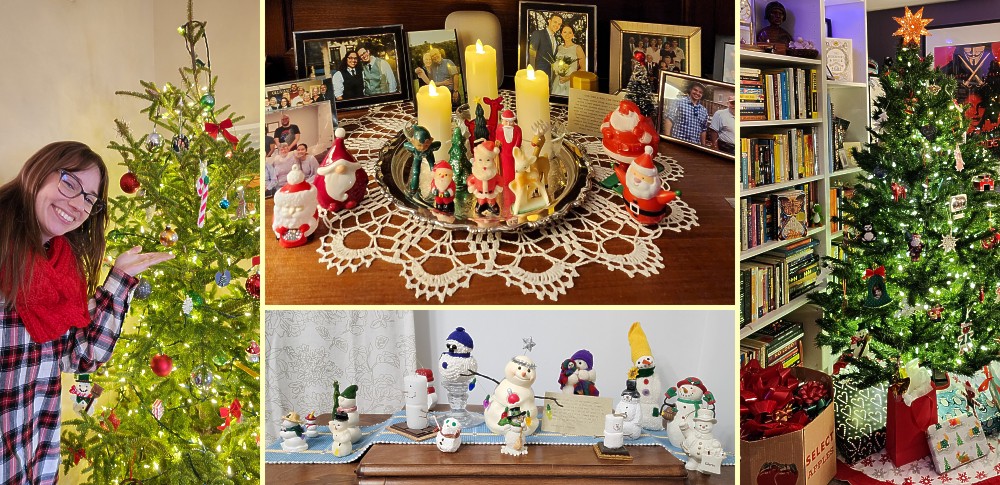Kansas Snapshots by Gloria Freeland - January 10, 2025
The gift of nostalgia
While most people I know have put their Christmas decorations away, ours still fill our home. Small Santas, trees, and deer grace
our dining-room hutch. Snow-people pose on the old sewing machine. The framed gingerbread man daughter Mariya made in kindergarten,
and her sister Katie’s framed scene of Santa inside a home while a snowman peeks in through a window hang on the wall. Our tree
twinkles with the colored lights husband Art strung, reflected in the dozens of ornaments I placed among its branches.
I'm never in a hurry to "pack away" the holiday. For me, each item has a story to tell and each evokes memories of people we've
known, places we've been, and past holidays we've celebrated.
I sometimes get lost in those recollections, and a bittersweet feeling touches my heart - sweet thoughts of loved ones mixed with
the knowledge that some moments can never be re-captured. Still, I am thankful they happened.
I'm not the only family member moved by such emotions during the Christmas season and into the New Year. Mariya's downstairs tree
(she has two) has ornaments that belonged to her Freeland grandparents, and it is topped with a star that belonged to my late
husband Jerome - the biological father Mariya never knew. Katie's tree is adorned with her grandmother Donna's glitter-speckled
balls - the ones Art gave his mother when he was about 12.
For me and for many others, the feeling of nostalgia is most prevalent during holidays. But other things can trigger it as well -
listening to music that was popular during my high school and college years, seeing movies and television shows that I watched as
a youngster, reading magazines such as "Saturday Evening Post" or "Reminisce," and perusing family photo albums.
Nature-based factors, such as weather and temperature, can also bring it on. When winter retreats and spring begins to unfold, I
often hear Art say, "I feel I should be out on a trout stream." That seasonal shift brings to mind opening-day forays with his dad
of years now long past.
These feelings are present across generations and cultures. The Portuguese "saudade," the German "Sehnsucht," the Japanese "mono no
aware," the Amharic-Ethiopian "tizita," and the Welsh "hiraeth" also describe the love and longing for someone or something that has
been lost and may never be regained and the aching feeling that all things are transient.
It well may be the sometimes-painful aspect of nostalgia that caused Johannes Hofer, a Swiss physician, to view it as a disorder of
the brain. He coined the term in 1688, combining the Greek words "nóstos," meaning "homecoming," and "álgos,' meaning "pain." He
described it as a mania tied to homesickness in Swiss mercenary soldiers who were fighting in foreign lands.
Today, nostalgia is a much-studied topic among psychologists and is no longer looked upon as a disorder, but as a natural, common,
and often positive emotion. Krystine Batcho, professor of psychology at LeMoyne College in Syracuse, New York, is an expert on the
subject. In the 1990s, she developed the nostalgia inventory, a survey that assesses proneness to personal nostalgia. People are
asked what they miss about their younger days ... family, toys, places, TV shows, movies, holidays, homes ... and rank each item by
how much they miss it on a scale - 1 (not at all) to 9 (very much).
While Hofer saw it as a bad thing, Batcho and other researchers have found nostalgia can have positive effects. Remembering people
we were close to, such as family members, romantic lovers, or friends, can increase our sense of social support. Nostalgia also
serves as a motivator for preserving buildings, landscapes, and other artifacts of historical and cultural significance. In
addition, it helps people feel better about themselves and find meaning in life by initiating a desire to deal with problems or
stress. Some researchers have found that nostalgia correlates positively with one's sense of meaning in life. In brief, nostalgic
reflections can heighten positive emotions and help us cope with current situations.
However, some researchers emphasize that nostalgia can also become a defense mechanism employed to alter reality. For example, some
people who grew up in the 1950s think of it as an idyllic time, forgetting that it was the time of the Cold War, segregation of
Blacks, limited opportunities for women, and the scourge of polio. Studies suggest politicians sometimes invoke the notion of an
idealized past to bring to mind current social and cultural uncertainties. Marketers often use nostalgia to sell products we don't
need, but make us happy by associating them with earlier happy times.
Oddly, scientific studies have shown that cold weather makes people more nostalgic, and nostalgia also causes people to feel warmer.
As I write this, meteorologists have issued forecasts of sub-zero temperatures and the possibility of a foot of snow. Perhaps it's
a good time to listen to the Carpenters or John Denver, look through old photo albums, and enjoy the signs of the holidays that
still surround me. Those things do give me comfort and warm feelings! Nostalgia ... what a gift!
